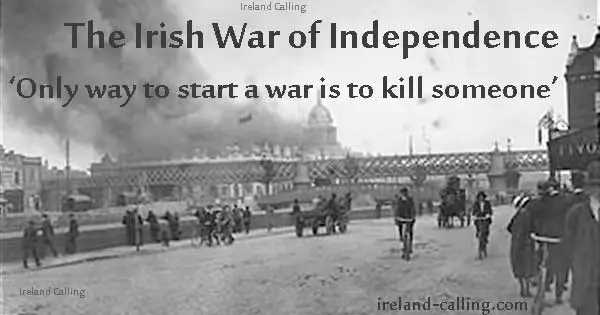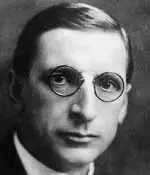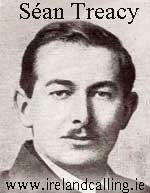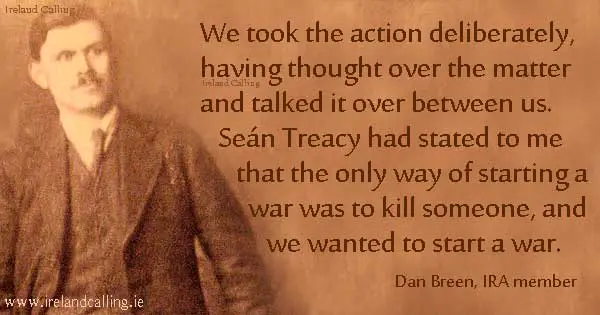The Irish War of Independence was a significant event in Irish history. It was a combination of political and military units fighting against the British authorities for the freedom of Ireland. It paved the way for the country finally becoming an independent republic.war-of-independence-top.htmlThe War of Independence took place from January 1919 until July 1921. It was fought between the Irish Republican Army, a military group closely associated with the political party Sínn Féin, and the British authorities in Ireland, which were made up of the British Army, the RIC, and the Black and Tans.

The War of Independence began just three years after the Easter Rising. The harsh punishments handed out to the Rising leaders – 15 men were executed and thousands more imprisoned – had swayed the public opinion in Ireland in favour of the nationalists.
Sínn Féin were the political party Ireland wanted
 In the 1918 General Election, Sínn Féin won 73 of the 105 Irish seats. They received 91% of votes cast outside Ulster, where the majority of people were still loyal to the British. The people of Ireland had clearly stated that they wanted to be governed by their own party, not by British MPs.
In the 1918 General Election, Sínn Féin won 73 of the 105 Irish seats. They received 91% of votes cast outside Ulster, where the majority of people were still loyal to the British. The people of Ireland had clearly stated that they wanted to be governed by their own party, not by British MPs.
Led by Éamon de Valera, the members of Sínn Féin refused to take their seats in the British Houses of Parliament, and instead set up the first Dáil, to run Irish affairs from Ireland.
Various incidents of violence had occurred across Ireland since the Easter Rising, with riots and scuffles taking place sporadically. However, in 1919 the IRA decided that organised military action was needed in order to achieve their goal of an independent Ireland.
‘Only way to start a war is to kill someone’
A group of IRA soldiers in Tipperary led by Séan Treacy decided to start the war. They ambushed and killed two RIC policemen who were transporting explosives between two British Army sites.
Dan Breen, who was alongside Treacy that day later revealed the group’s mentality at the time:

“We took the action deliberately, having thought over the matter and talked it over between us.
“Treacy had stated to me that the only way of starting a war was to kill someone, and we wanted to start a war, so we intended to kill some of the police whom we looked upon as the foremost and most important branch of the enemy forces.
“The only regret that we had following the ambush was that there were only two policemen in it, instead of the six we had expected.”

More violent attacks on British officials followed, notably the murder of Magistrate John C. Milling, who had previously sentenced numerous Irish Volunteers to prison.
Michael Collins puts together his assassination ‘squad’
war-of-independence.html
